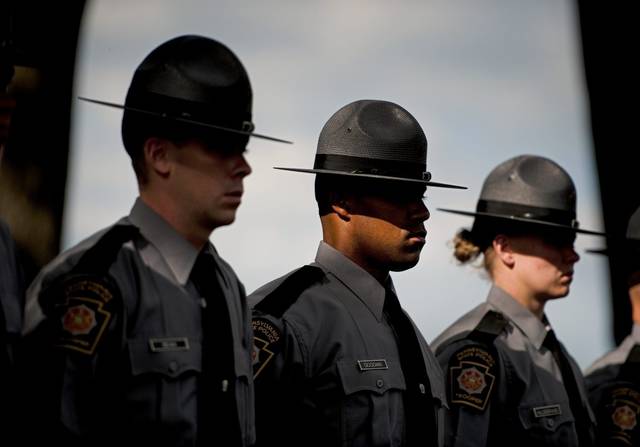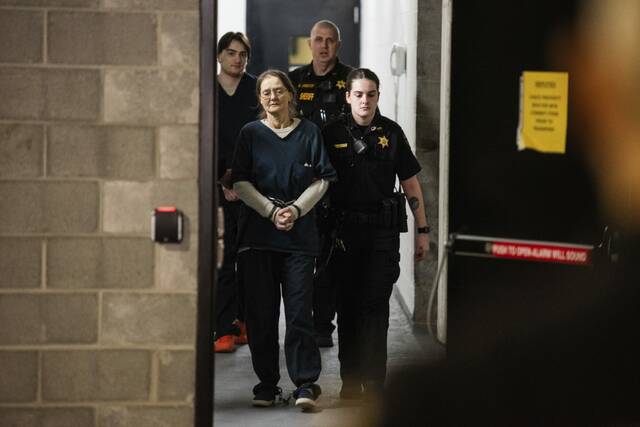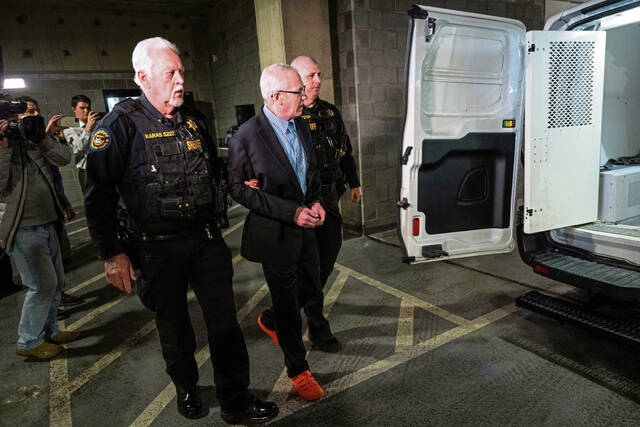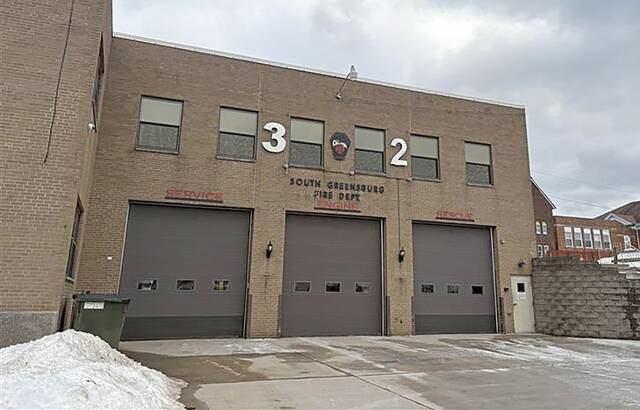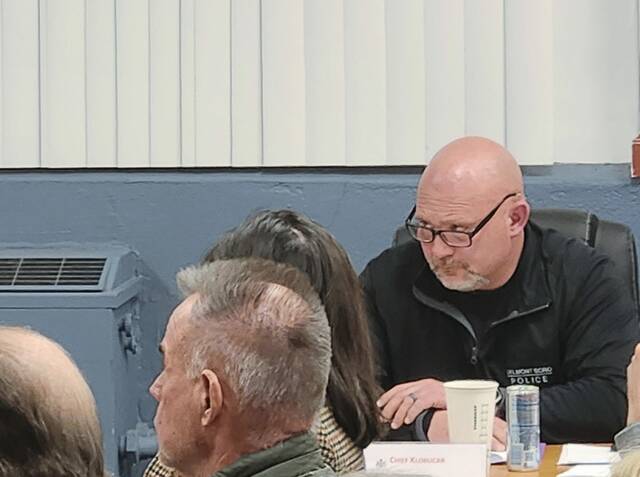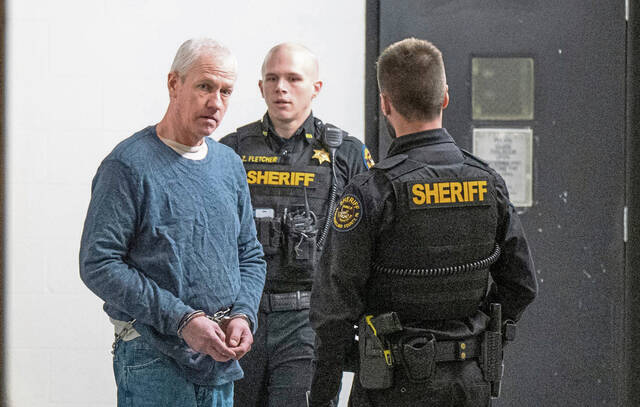Gov. Tom Wolf wants to charge Pennsylvania communities a fee for state police coverage, regardless of whether the municipality has its own police force, according to his 2020-21 state budget proposal.
Under the proposal, Hempfield and Unity townships would pay $76 per resident, according to state data. Neither township has its own police force and both rely on state police coverage.
“We believe that our residents are essentially paying for state police coverage with our state income taxes, state taxes in general,” said Unity Supervisor Mike O’Barto. “Our residents are paying a tremendous amount of money to the state.”
Hempfield Supervisor George Reese agreed.
“He’s done this before; it’s a proposal, request,” Reese said. “I don’t agree with it. Our residents pay their fair share in taxes.”
Jeannette, Ligonier and Ligonier Township would pay $7.52 per resident. All three of those municipalities have their own police force.
Wolf has made similar proposals over the past few years, but this year’s formula is a bit different. The fees are based on several factors: the cost to operate the state police station that covers the area, whether the municipality has its own police, the median income of the municipality and the types of state police services used.
The proposal would bring in $136 million, according to state figures. Four additional state trooper cadet classes could begin in 2020-21 with the funding, Wolf said in his budget proposal.
“The (Pennsylvania State Police) has developed a model that is fair, reasonable and a good starting point for ongoing discussions,” Wolf wrote.
In past years, Wolf has proposed a $25-per-person fee and a sliding-scale share based on a municipality’s population. For the past several years, fees and gas taxes paid by motorists have been directed to support state police costs, rather than to fix roads and bridges.
Officials estimated in 2017 that it costs state police almost $600 million to provide services to municipalities without a full-time force. That equates to about $234 per resident in those communities. According to the Pennsylvania Department of Community and Economic Development, 25 municipalities in Westmoreland County rely on state police coverage.
The state police station just outside Greensburg in Hempfield costs about $23 million annually to operate, according to state figures. The Belle Vernon station in Rostraver costs $9.8 million to run each year and the Kiski Valley station in Bell has a $5.6 million annual budget.
Hempfield, with a population of more than 40,000 residents, is the largest municipality without a police force in the state. The township would be on the hook for $3.1 million, according to state data. That would amount to about 22% of township’s 2020 budget of $14 million.
Unity has about half as many residents, and the township’s fee would be $1.7 million, or about 24% of its $7 million 2020 budget.
Both O’Barto and Reese said it would be a huge cost to start their own municipal forces. Reese questioned what residents would get if the proposal passes.
“My understanding — nothing changes,” he said. “That’s just what we’re going to be charged.”
Hempfield Supervisor Doug Weimer said he thinks the proposed formula is unfair and results in a disparity among communities where some residents have the same income.
“One community shouldn’t have a different rate than another community,” he said.
Smaller municipalities that rely on state police coverage, like Youngwood, East Huntingdon and Donegal borough and township, would be charged about $30 per resident. Population in those communities ranges from 112 people in Donegal Borough to nearly 3,000 in Youngwood.
To make communities that already have a municipal police force pay the fee, like North Huntingdon, “is a kind of madness,” said township Manager Jeff Silka.
He questioned why the township should pay $19 per resident for state police services when the municipality already operates its own police department. The township uses state troopers for major crimes, “not basic law enforcement,” he said.
If the $576,000 proposed fee for the township to pay was added into the budget, Silka said it would require the equivalent of 2.5 mills in taxes. Greensburg, which would be charged $3 per resident, would face similar tough decisions, said Mayor Robert Bell.
“That $38,000 has got to come from somewhere, and we don’t know where it would come from,” he said. “We’d have to sit down and figure that out.”
Unless the money can be found in the police department budget — which Bell doubts — the city might have to create a new tax to cover the proposal, if it passes, he said. Greensburg budgeted about $4.4 million for its police department in 2020, the largest share of the city’s $12 million spending plan.
In Irwin, which has its own police force, would be charged $28,000 under the proposed formula, which is equal to $7.52 per resident. The borough receives about $32,000 in revenue for each mill it levies, said Shari Martino, borough manager.
Irwin police Chief Roger Pivirotto, a former state police commander, said his department does use state police services such as the crime lab in Greensburg, as well as training the state police conduct. If there were a case of a person barricaded in a house, Pivirotto said, his department might call for the state police SWAT team or ask for a state helicopter.
The use of state police in the borough “is very minimal,” Pivirotto said.
State legislators have a deadline of June 30 to adopt a new spending plan.
“That’s a tough situation for every municipality, but we’re putting the cart before the horse because I don’t even know if it’s going to pass,” Bell said.
Proposed per-person fees across the state range from a quarter in some Allegheny County towns such as Blawnox, Braddock and Clairton, to $146 in one Chester County community.
Staff writers Joe Napsha and Jacob Tierney contributed.


